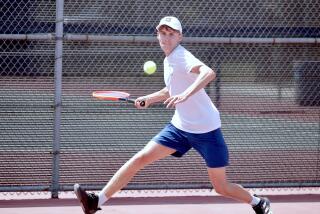ATTITUDES / CHALLENGES : A Winning Match : Wheelchair-bound tennis player Isaias Ugarte, 14, is making a new life with the help of love.
- Share via
Isaias Ugarte moved haltingly toward the net last Saturday, his tennis racket suspended a few inches above Ventura College’s rain-drenched court. His first-ever tournament was scheduled to start half an hour before, but now, with the weather showing no sign of letup, all anyone could do was wait and hope. That, and maybe pass the time with a bit of volleying.
Plonk! With a sweep of his hand, Isaias sent the ball sailing deep into the net. He shook his head in frustration. Plonk! This time the ball landed perfectly, too far away for another tournament participant to return it. Isaias turned toward the bleachers--covered with blankets and tennis fans oblivious to the rain--and beamed.
“He’s going to be so bummed if he doesn’t get to play today,” said Cindy Hancock, who had driven in a few hours earlier with Isaias from her ranch in Santa Ynez. “This means so much to him.”
Three years ago, when the Ventura Department of Parks and Recreation put on its first Coast Classic Wheelchair Tennis Tournament, Isaias, now 14, couldn’t have cared less.
Never mind that wheelchair athletes from throughout California and as far away as Canada had come to play, showing a lot of able-bodied players in the process the meaning of spirit. And never mind, too, that the sport had become so popular in recent years there were tournaments all over the world.
In Isaias’ world--a small house crowded with five siblings in the barrio of Los Angeles--tennis had about as much relevance to daily life as the rings of Jupiter. The game there had a much tougher imperative: surviving in a place where drive-by shootings had come to feel almost like a natural part of the landscape.
But a year ago, an automobile accident changed everything. His mother, the driver, was killed instantly. Isaias, seated beside her, was paralyzed from the waist down. When he returned home from the hospital five months later, the reality of his situation sank in: His medical and personal care needs were simply too much for his teen-age sisters to handle.
“I didn’t want to do anything,” Isaias said, twisting the handle of his racket. “I just lay in bed. You feel like your life is ended.”
Then, Cindy Hancock got a phone call from her sister, a rehabilitation teacher with an office in Childrens Hospital in Los Angeles, asking if she would be interested in caring for him. “When I heard he was a teen-ager from the barrio, I was going to say no,” said Hancock, a 41-year-old single mother who has had several foster children stay with her. “But my sister kept saying, ‘He’s savable, Cindy.’ Finally, I agreed to have him for 30 days.”
When Isaias showed up at her door, she took a deep breath. “He had this tough-guy look, his hair was greased back and he had this weird L.A. haircut. So I looked right at him and said, ‘You scared?’ He said no.
“Then he said, ‘Are you?’ and I said, ‘Are you kidding? Of course I’m scared! I have a stranger coming to live with me in my house.’ That’s when I saw the attitude fall away. It just crumbled right there.”
The first few months were like nothing he’d known before. Hancock sat with him for hours while he did his homework. She worked with him on his grammar and pronunciation. She told him that the image he had of himself--as unintelligent and incapable of doing anything with his life--was false.
“At the same time he got some wonderful support from people in the community,” Hancock said. “His teacher had kids write their life stories, and Isaias read his out loud and everyone cried. Then she went out and got 15 wheelchairs and the kids all were in wheelchairs for a day. He was instantly accepted.
“Then the Solvang Vikings Men’s Club donated a sports wheelchair to him,” she said. “I couldn’t have afforded that.”
Soon, Isaias was comfortable enough in his new life to ask Hancock if he could go to the school dance. “I like to slow dance,” he said to her afterward. “The girls wrap their arms around you.”
Then he read about a six-week course in wheelchair tennis being offered at Buena High School in Ventura. Tito Bautista, the wheelchair tennis instructor who gave Isaias his first lesson in May, saw him instantly as willing.
“He was a nice kid to teach,” he said. “Usually, after they become injured, it takes at least a year before they realize they’ll be in a wheelchair the rest of their lives. . . . He was just injured a year ago.” Getting out there on the court, he said, is a sign of having “overcome the bitterness.”
For Isaias, out on the court after learning that the tournament would indeed go on, now there was just that matter of overcoming the guy on the other side of the net. He stared intently at his opponent.
Plonk! 15-love. Plonk! Plonk! 30-love. Plonk! 45-love. Game to Isaias. In the best-of-three match, Isaias took it 6-2, 6-2.
From her spot on the bleachers, Cindy Hancock cheered. Now there would be the semifinals, postponed indefinitely because of the rain. But that didn’t matter. Months ago, she decided to make the foster arrangement permanent.
“It’s a miracle,” she said. “I get to have another son without getting stretch marks.”
Maybe it was something they both had learned.
In tennis, love means nothing.
In the real world, it means a lot.
More to Read
Go beyond the scoreboard
Get the latest on L.A.'s teams in the daily Sports Report newsletter.
You may occasionally receive promotional content from the Los Angeles Times.










